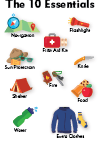Leader Guide
Practical advice on how to adapt your meetings and badge requirements to be inclusive of all your scout’s needs.
Individualized Scouting Plan
Use this template to document your adaptation plan so you can discuss it with the scout’s parents and other leaders.
Rubric for Evaluating Special Needs
A simple guide to help you determine if a scout needs accommodations and at what level.
Additional Resources
The leader guide talks about using tools that have both words and pictures in certain situations and provides examples. You can download those handouts for use with your group. You can also download the images used in them to make your own handouts.
Need More Ideas?
If you need more help after reading the guide, please reach out to me for further ideas with our Contact Us form or comment on our Outdoor Service Guides Special Needs Facebook group for help from our community.
We want to provide support to our leaders by anticipating the kinds of situations they may encounter with youth scouts. If you think of a specific topic that is not covered in the guide and have expertise you would like to share with the OSG community, please comment below or join the discussion in the Facebook group. If you want to author a section for the guide on a topic that is not currently included, or write a blog post for this site on a topic, let me know. I would love to include more voices from our region and the broader OSG community in these discussions and information sharing.



